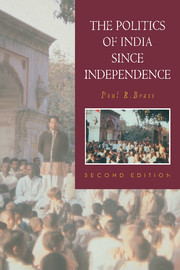Book contents
- Frontmatter
- Dedication
- CONTENTS
- List of figures and tables
- Preface
- List of abbreviations
- 1 Introduction: continuities and discontinuities between pre- and post-Independence India
- PART I POLITICAL CHANGE
- Introduction
- 2 Political change, political structure, and the functioning of government
- 3 Parties and politics
- 4 State and local politics
- PART II PLURALISM AND NATIONAL INTEGRATION
- PART III POLITICAL ECONOMY
- Bibliography
- Index
3 - Parties and politics
Published online by Cambridge University Press: 05 February 2015
- Frontmatter
- Dedication
- CONTENTS
- List of figures and tables
- Preface
- List of abbreviations
- 1 Introduction: continuities and discontinuities between pre- and post-Independence India
- PART I POLITICAL CHANGE
- Introduction
- 2 Political change, political structure, and the functioning of government
- 3 Parties and politics
- 4 State and local politics
- PART II PLURALISM AND NATIONAL INTEGRATION
- PART III POLITICAL ECONOMY
- Bibliography
- Index
Summary
Party politics in India display numerous paradoxical features, which reveal the blending of Western and modern forms of bureaucratic organization and participatory politics with indigenous practices and institutions. India's leading political party, the Indian National Congress, is one of the oldest in the world, yet it has not succeeded in providing the nucleus for an institutionalized party system which can be fitted easily into any one of the conventional categories of party systems known in the West. There has been a strong Marxist and Communist revolutionary tradition in modern Indian political history. However, unlike other such traditions in most parts of Asia, its dominant parties and movements have neither succeeded in threatening the stability of the Indian state nor been threatened with physical extinction as in Indonesia, but have instead been integrated in the form of reformist political parties within routine politics in the country. The diversities and social fragmentation of Indian society have produced a proliferation of regional and other political parties which often give to each state in the Indian Union a unique party system imperfectly integrated into the “national party system.” Some characteristically Indian features pervade virtually all parties in the country — factionalism, dynastic succession to leadership, and the presence of ideological differences among the parties without ideological cleavage in the party system.
Indian politics are distinctive among contemporary developing societies in having had forty-five years of nearly continuous—excepting the brief Emergency period — competitive electoral politics in which also alternation in power has occurred in all the Indian states and at the Center as well. Here, also, there are numerous paradoxical features and indigenous adaptations of an essentially British electoral system. These include: varying, but often quite high turnout rates among a population still overwhelmingly agrarian and illiterate; a special form of representation for “untouchables” or Scheduled Castes; electoral arenas not yet fully dominated and controlled by organized political parties; and the critical importance of the electoral process as a mechanism for the successive introduction of groups of voters, particularly caste groups, into politics, which impart to the Indian electoral process a quality which is quite different from the classic ideal of the electoral arena as a place where the “independent intelligence of the individual voter” is exercised.
- Type
- Chapter
- Information
- The Politics of India since Independence , pp. 67 - 115Publisher: Cambridge University PressPrint publication year: 1994



